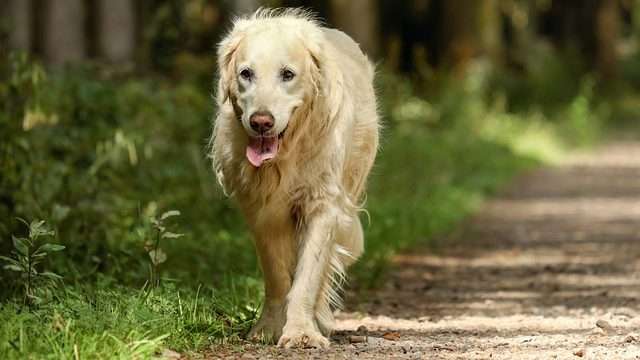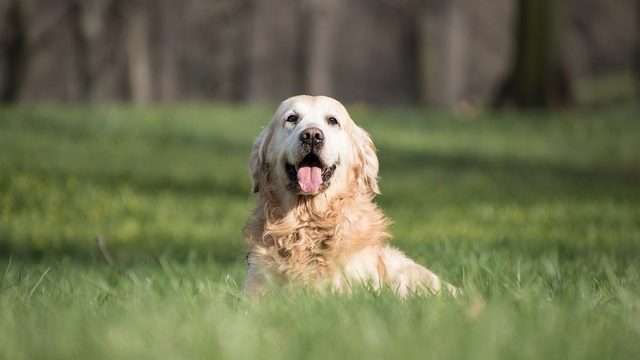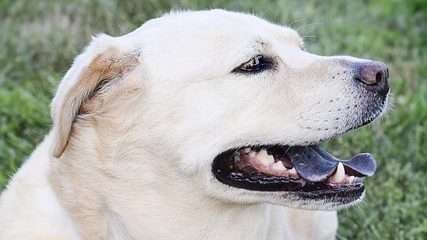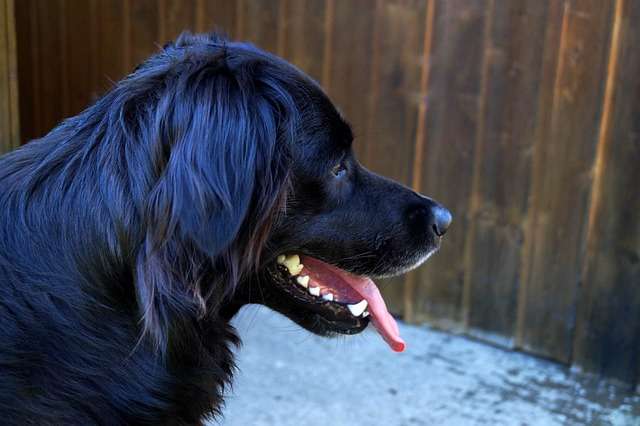Is Your Golden Retriever Panting Too Much? What You Need to Know.
Is your Golden Retriever panting excessively? It’s essential to understand the causes of this behavior and how to manage it. In this article, we’ll explore the reasons why Golden Retrievers pant, including potential health issues and environmental factors. Learn how to help your furry friend stay cool and comfortable all year round. Read everything you need to know about your Golden Retriever dog’s panting.

Reasons Why Golden Retriever Panting
Golden Retrievers are a beloved breed, known for their friendly temperament, loyalty, and love of exercise. However, like all dogs, Golden Retrievers can experience health issues and display certain behaviors that may cause concern. One of the most common behaviors that Golden Retriever owners may notice is panting. But what causes Golden Retrievers to pant? Here are Reasons Why Golden Retriever Panting:
1. Heat and humidity
Golden Retrievers, like many dogs, are sensitive to high temperatures and humidity. They don’t sweat as humans do, so they rely on panting to cool themselves down. If your Golden Retriever is panting heavily on a hot day or during exercise, this is likely a normal response to the heat.
2. Anxiety and stress
Panting can also be a sign of anxiety or stress in Golden Retrievers. If your Golden retriever is panting excessively in situations that don’t seem particularly hot or strenuous, it may be feeling anxious or stressed. Some common triggers for anxiety in dogs include loud noises, separation from their owners, and new or unfamiliar environments.
3. Pain or discomfort
Another possible reason for Golden Retriever panting is pain or discomfort. Dogs may pant when they are experiencing pain, whether it’s from an injury, illness, or chronic condition. If your Golden Retriever is panting and also displaying other signs of discomfort, such as whining or limping, it’s important to consult with your veterinarian.
4. Respiratory issues
Certain respiratory issues can also cause Golden Retrievers to pant. For example, if your dog has an upper respiratory infection or allergies, it may pant more than usual. In some cases, panting can also be a symptom of a more serious respiratory issue, such as laryngeal paralysis or pneumonia.
Related Topic: Understanding the Worst Age for Golden Retrievers
What to do to stop Golden Retriever panting?
While panting is a normal behavior for Golden Retrievers, excessive or persistent panting can be a cause for concern. Here are some tips on how to manage your Golden Retriever’s panting and What to do to stop Golden Retriever panting.
1. Provide access to cool water
Make sure your Golden Retriever has access to plenty of cool, fresh water at all times. This can help them stay hydrated and regulate their body temperature.
2. Create a cool environment
When the weather is hot or humid, make sure your Golden Retriever has access to a cool, shady spot where they can rest. You can also use fans or air conditioning to help keep the environment cool.
3. Reduce anxiety and stress
If your Golden Retriever panting is due to anxiety or stress, it’s important to identify the triggers and take steps to reduce them. This may involve behavioral training, providing a safe and secure environment, or using calming aids like pheromone diffusers or supplements.
4. Treat underlying health issues
If your Golden Retriever panting is due to an underlying health issue, such as an infection or respiratory problem, it’s important to work with your veterinarian to develop a treatment plan. This may involve medication, surgery, or other interventions depending on the specific issue.
Golden Retriever Puppy Panting
If your Golden Retriever puppy is panting excessively, it could be a sign of a few different things. Puppies are still developing and their bodies are adjusting to new environments, so panting is sometimes normal. However, excessive panting in a puppy can also be a sign of overheating, dehydration, or stress.

- If your Golden Retriever puppy is panting and appears to be overheated, move them to a cooler area and provide them with fresh water. Puppies have a harder time regulating their body temperature than adult dogs, so it’s important to keep them in a cool, well-ventilated area, particularly during hot weather.
2. If your Golden Retriever puppy is panting due to dehydration, offer them fresh water and make sure they are drinking enough. It’s important to keep puppies hydrated, particularly during periods of increased activity or warm weather.
3. Finally, if your Golden Retriever puppy panting due to stress, try to identify the source of their anxiety and address it. Puppies can be easily stressed by changes in their routine, new people or animals in the home, or loud noises. Providing a calm and quiet environment, giving your puppy plenty of attention and exercise, and using calming aids such as pheromone diffusers can all help reduce stress in puppies.
If your Golden Retriever puppy continues to pant excessively despite your efforts to address the issue, it’s important to consult with your veterinarian to rule out any underlying health conditions.
Read This: Debunking the Myth: Are Golden Retriever Puppies Hyper?
Everything you need to know about your Golden Retriever panting
Here we try to answer all the questions that people ask about Golden retrievers panting.
why is my Golden retriever always panting?
If your Golden Retriever panting constantly, it may be a sign of an underlying health issue or environmental factor. A golden retriever always panting is not a good sign. Some possible health diseases and causes of constant panting in Golden Retrievers include respiratory problems, pain or discomfort, anxiety or stress, or overheating. It’s important to observe your dog’s behavior and consult with your veterinarian if you notice any unusual or persistent panting.

Your veterinarian can help diagnose the underlying cause and recommend appropriate treatment, which may include medication, changes to the environment, or behavioral interventions. In the meantime, make sure your Golden Retriever has access to plenty of cool, fresh water and a comfortable, cool environment to help regulate their body temperature and reduce any anxiety or stress.
Golden Retriever Panting After Walk
It’s common for Golden Retrievers to pant after a walk or other physical activity, as panting helps regulate their body temperature and cool them down. However, if your Golden Retriever panting excessively or seems to be having trouble catching their breath after a walk, it may be a sign of overexertion or an underlying health issue.
Make sure to monitor your dog’s behavior during and after walks, and adjust the intensity and duration of walks as needed based on their age, health status, and fitness level. If you notice any unusual or persistent panting, consult with your veterinarian to rule out any underlying health problems. Additionally, providing access to cool, fresh water and a cool, comfortable environment can help your Golden Retriever regulate their body temperature and recover after a walk.
Golden Retriever Panting and Shaking
If your Golden Retriever is panting and shaking, it may be a sign of anxiety, stress, fear, pain, or discomfort. It’s important to observe your dog’s behavior and try to identify any triggers or underlying issues. Some possible causes of panting and shaking in Golden Retrievers include thunderstorms, fireworks, separation anxiety, injury or illness, or exposure to extreme temperatures.
If your Golden retrievers panting and shaking are accompanied by other symptoms like lethargy, vomiting, or diarrhea, it may be a sign of a more serious health problem and you should seek veterinary attention immediately. In the meantime, try to provide a calm and safe environment for your Golden Retriever and consider using calming aids like pheromone diffusers, supplements, or behavioral training techniques to help reduce their anxiety and stress.
Golden Retriever Panting and Pacing
If your Golden Retriever’s panting and pacing are accompanied by other symptoms like restlessness, loss of appetite, or lethargy, it may be a sign of a more serious health problem and you should seek veterinary attention immediately. In the meantime, try to provide a calm and safe environment for your Golden Retriever and consider using calming aids like pheromone diffusers, supplements, or behavioral training techniques to help reduce their anxiety and stress.

Additionally, providing plenty of exercises and mental stimulation can help reduce your Golden Retriever’s overall stress levels and improve their behavior.
Do golden retrievers pant more than other breeds?
Golden Retrievers are not known to pant more than other breeds, but they may be more prone to panting due to their physical characteristics and temperament. Golden Retrievers have a dense coat and tend to be active, which can cause them to become overheated and pant to regulate their body temperature.
Additionally, Golden Retrievers are known for being sociable and loyal dogs, which can make them more prone to separation anxiety and stress-related panting. However, it’s important to note that excessive or persistent panting in any breed of dog may be a sign of an underlying health issue and should be evaluated by a veterinarian.
Old golden retriever breathing heavy
If an old Golden Retriever is breathing heavily, it may be a sign of an underlying health issue, such as heart or lung disease, obesity, or an upper respiratory infection. As dogs age, their respiratory and cardiovascular systems may become less efficient, making it more difficult for them to breathe and regulate their body temperature.
Additionally, older dogs may be more susceptible to chronic conditions that can affect their breathing, such as arthritis or cancer. If your old Golden Retriever is breathing heavily or struggling to breathe, it’s important to consult with your veterinarian for a proper diagnosis and treatment. Your veterinarian may recommend diagnostic tests, such as blood work or X-rays, and may prescribe medications or other interventions to help manage your dog’s symptoms and improve their quality of life.
Conclusion
Panting in dogs can be influenced by a variety of factors such as age, breed, health condition, environment, and activity level, among others. While some breeds may be more prone to panting than others due to their physical characteristics or temperament, it’s important to remember that excessive or persistent panting can be a sign of an underlying health problem and should be evaluated by a veterinarian.
If you have concerns about your dog’s panting, it’s always best to consult with your veterinarian for an accurate diagnosis and appropriate treatment.


